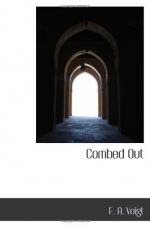We entered Victoria Station. I opened the door of the compartment with hasty, trembling hands. I did not wait to change my French money, but hurried out into a street and got on to a ’bus.
London, with its subdued lights, lay all around me. It had not changed since I saw it last, and yet I felt it ought to have changed. The reason was that I had changed. And then I began to fear that I had changed beyond the power of recovery. The oppressive sensation that I was in a dream forced itself upon me. I felt that there was only one reality in the whole world—the war. Would I ever escape from the war? It would come to an end some day, and I would leave the army, but would not the war obsess me until the end of my life? Would I ever be myself again?
But this was not the way to enjoy my leave! I began to feel disappointed at not being so happy as I had expected to be. Why was I not full of rapture? Why did not every object fill me with delight? But I ought to have known that habitual discontent and bitterness and revolt are not shaken off in a few hours or a few days, and that they persist even after their immediate cause has been removed.
I looked round at the other people sitting on the ’bus. I had visited foreign countries in former years, but never before had I felt that I was amongst complete strangers. There are moments when a dog, a horse, or a bird fills us with a sense of the uncanny—its mind is an insoluble mystery, with depths so dark and inscrutable that one feels something that approaches fear and horror. And so it was as I sat on the ’bus. The civilians around me seemed like animals of a different species. They were not human at all—or was it I who was not human?
I went to another seat in order to listen to a man and woman who were talking together. I felt that if they were to talk about the war, the uncanny spell would be broken, the dream would dissolve and I would be restored to my own fellow creatures. But they spoke about trivial domestic matters and about a flower show. If they had only mentioned the word “war” I would have felt relieved by its familiarity, but they did not mention it once.
And then, in great mental agony, I said to myself: “I will be happy, I will enjoy my leave.” But a number of invisible cobwebs hung between myself and the world around me. I tried to brush them away, but they were so impalpable that the movement of my hand did not disturb them at all.
I gave up the attempt. I would wait until I got home. Then I would talk and forget myself—only by forgetting myself would I enjoy the present. Only those who forget themselves are happy. The obsession of self is the most oppressive of all burdens.
I descended from a ’bus and took a train. A girl sitting opposite me stared at my blue chevrons and whispered to her fellow passenger: “He’s just come from the front.” So I too was regarded as a strange kind of animal. I got out at my home-station. I showed my leave-warrant to the ticket collector. He was a benevolent looking old man. He smiled and wished me good luck. Things began to seem a little less foreign. And then the thought of being home in a few minutes absorbed me entirely.




